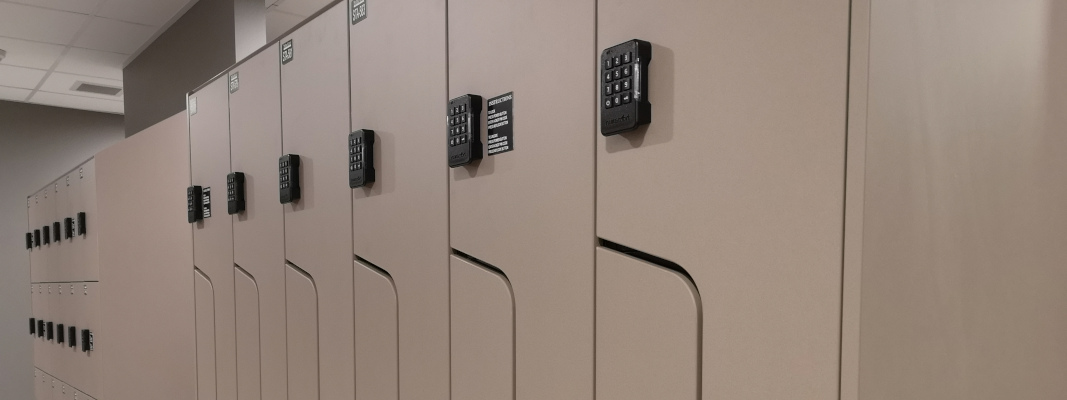There are different types of locks to consider when purchasing lockers. In this article, we are to dwell further on each type of strengths and weaknesses.
We will also list down other types that we have failed to include in the previous article. You may consider this an updated and upgraded version of the previous article as well.
A throw-in bonus we will also be discussing which types might just be the perfect fit depending on the type of locker you have.

Padlock Receptor
We will begin with the ever-classic locker lock, Padlocks. It has been around for almost as long civilization has existed. Dating back to the Roman era of 500 BC – 300 AD. It is basic type of lock where a user is free to use their lock to close the locker.
Pros
- Padlocks are usually light and portable
- Tried and Tested
- Many available types to choose from
Cons
- Keys are often lost or misplaced
- Often the main target of thefts
- Some locks are prune to erosion
The takeaway for this type of lock is that, despite it being tried and tested, the advancement of technology has rendered this type of lock obsolete to some degree. With better tools and new methods, thieves can easily bypass the security of this type of lock.
This type of lock could only work on lockers that have a free built latch.

Combination Locks
It is a type of padlock that requires a sequence of symbols, usually numbers, to open.
Pros
- Similar to regular padlocks, most are light and portable
- No need for key
- Offers thousands of combinations making it harder to guess
Cons
- One of its core advantages is perhaps also one of its greatest weakness.
As there are thousands of possible combinations, it makes it harder to keep track for locker owners. - As most of this type of locks have predetermined combination, the moment that others figure out the code is the time that the lock pretty much becomes useless.
- Some of this type of lock offers a key reset. Unfortunately, similar to issues with regular padlocks, the key can easily be misplaced and lost, rendering the lock unusable.
Though more accessible compared to a regular padlock. Combination locks still have its share of problems. One of its biggest concern is in terms of monitoring if you have a facility that has more than 50 lockers. Using combination locks might not be the best tool for you.
Like regular padlocks, combination lock could only be used on lockers that have free built latch on them.

Dead Bolts / Dead Locks
It is a type of locking mechanism that can only be engaged by the turning of a key. Typical deadbolts found in lockers use a single-cylinder mechanism in that it will only accept a key on one side of the lock.
Pros
- The unique locking mechanism gives you the utmost protection against forceful physical attack.
- The deadbolt lock requires a lot of time to break in and is tougher to open so it leaves the decision on the intruder that whether to break into the locker or not as this increases the chances of him being caught or spotted.
Cons
- Like padlocks, keys are prone to be misplaced or lost.
- Although these locks are typically very durable and difficult to cut through they are susceptible to lock bumping.
This type of lock is comparably more secure than the others. Though in terms of maintenance and ease of accessibility may cause a bit of a headache to some.

Coin Deposit Locks / Coin Return Locks
The name of this type of lock for lockers pretty much indicates how it operates.
Pros
- Reduction in operating costs: having to issue and give back keys, which requires staff, is avoided.
- The locker using this type of lock could be used by several visitors in a day.
- Keys cannot be lost: the locker key is kept in the locker itself until it is in use. After opening the locker, the key cannot be removed again
Cons
- Staff must always monitor and empty the cash box before they become full.
- This type of lock could be potentially deemed unfair if someone forgets something from their locker and will have to pay twice.
This type of lock for lockers works best in public spaces where people can have easy access to storage while on the go. Some of these are Train stations, amusement parks etc.

Barrel Lock / Cylinder Lock
Could be considered the most common type of locker lock used in most school lockers, office, and business facilities. This type of lock for lockers uses a cylinder that rotates to move a bolt; tumblers are pins; inserting the key lifts and aligns the pins to free the cylinder to rotate.
Pros
- This type of lock has a master key which helps saves the building manager from going through several keys to open one.
- A master key can be created to open all the cylinder locks.
Cons
- Can be forced open using lock picks
- Can quickly be opened by bump keys.
- If the master gets lost, you will need to hire a locksmith to either unlock it or force open it.

Cam Locks
Most used as an alternative lock on metal lockers that are used as a file cabinet or drawers. A Cam Lock consists of a stationary cylinder portion that when unlocked or turned, a cam rotates 90 degrees at the back end unlocking or unlatching the door or drawer is secured.
Pros
- Cam locks are available in many styles and finishes to suit the needs of various applications.
- Can be relatively cheap and easy to install.
- Its small size makes it perfect to use on lockers that have small panels.
Cons
- These locks are not typically as durable or secure as other types of locking devices and may not be enough for high-security applications.
- They are typically easy to break into by drilling or using other lock picking tools.
- It may be difficult to impossible to replace the keys on a cam lock if they are misplaced, or if additional keys are required.

Electronic Lock / Digital Lock / Smart Lock
An innovative locking solution that integrates security and modern technology. Comes in different types of design and locking mechanism, with the use of 4-digit pin code access being the most popular.
Pros
- A good digital lock can do bulk programming. It can easily program at least 60 locks all at once.
- Smart Lock and other digital locks are now made to withstand wet or arid areas, suitable for any kind of use anywhere.
- An excellent digital lock has the option of being able to set it up using a mobile app.
Cons
- Some locks are prone to power failure.
- Sometimes pin may be forgotten by the user.
- Being a relatively new locking solution most users are still a bit sceptical of its security.
Could be considered one of the best locking solutions to use in the modern era. A smart lock or digital lock has tons of advantages, most never needing a key, being one of its best features. Though, like other locks, it shares some weaknesses a good lock provider can offer you locks than can reduce these vulnerabilities.
The NS1000 Smart Battery Lock offers all these advantages with reduced drawbacks. If you are interested or have any questions about the NS1000 Smart Battery Lock or would want to know how to be a distributor, you may contact us by clicking here or shoot us an email at info@nuesmart.com.


